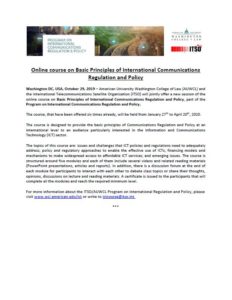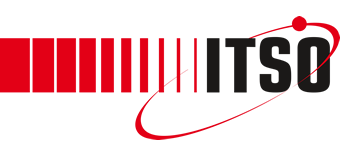
October 29, 2019
NEWS
 Washington DC, USA, October 29, 2019 – American University Washington College of Law (AUWCL) and the International Telecommunications Satellite Organization (ITSO) will jointly offer a new session of the online course on Basic Principles of International Communications Regulation and Policy, part of the Program on International Communications Regulation and Policy.
Washington DC, USA, October 29, 2019 – American University Washington College of Law (AUWCL) and the International Telecommunications Satellite Organization (ITSO) will jointly offer a new session of the online course on Basic Principles of International Communications Regulation and Policy, part of the Program on International Communications Regulation and Policy.
The course, that have been offered six times already, will be held from January 27th to April 20th, 2020.
The course is designed to provide the basic principles of Communications Regulation and Policy at an international level to an audience particularly interested in the Information and Communications Technology (ICT) sector.
The topics of this course are: issues and challenges that ICT policies and regulations need to adequately address; policy and regulatory approaches to enable the effective use of ICTs; financing models and mechanisms to make widespread access to affordable ICT services; and emerging issues. The course is structured around five modules and each of them include several videos and related reading materials (PowerPoint presentations, articles and reports). In addition, there is a discussion forum at the end of each module for participants to interact with each other to debate class topics or share their thoughts, opinions, discussions on lecture and reading materials. A certificate is issued to the participants that will complete all the modules and reach the required minimum level.
For more information about the ITSO/AUWCL Program on International Regulation and Policy, please visit www.wcl.american.edu/ict or write to ictcourse@itso.int.
***
In 1896, American University Washington College of Law (AUWCL) became the first law school in the country founded by women. More than 100 years since its founding, this law school community is grounded in the values of equality, diversity, and intellectual rigor. The law school’s nationally and internationally recognized programs (in clinical legal education, trial advocacy, international law, and intellectual property to name a few) and dedicated faculty provide its 1500 JD, LL.M., and SJD students with the critical skills and values to have an immediate impact as students and as graduates, in Washington, D.C. and around the world. For more information, visit wcl.american.edu.
The International Telecommunications Satellite Organization (ITSO) is an intergovernmental organization with the mission to ensure that Intelsat S.A. provides public telecommunications services, including voice, data and video, on a global and non-discriminatory basis. Headquartered in Washington, DC., ITSO currently has 149 member countries. For more information, visit www.itso.int.
***
Testimonials from the 2019 session
“We were afforded an opportunity to learn from other participants what is prevailing in their respective countries. This was not to read about it but people shared the dynamics of their countries in as far as ICT is concerned.”
“I found the course very rich in information and especially in best practices to implement.”
“The self-paced modules, the variety of lecturers and reading materials as well as the possibility to debate thoughts and opinions with the several participants made this online course absolutely enriching for me.”
“I say thank you very much to the organizers of this training which gave me the means to understand what needs to be done for the development of my country.”
“The course comprehensively makes key strategic information easily available and provides better leads for research. I recommend it for all who are involved with issues relating to ICTs as a custodian of the new economic landscape.”
“Throughout this course, I had the opportunity to discuss and overview the divergent aspects of ICT regulations and policies both from national and international viewpoints.”
“As an Electronics engineer, I needed to take a glance and appreciate the intricate aspects that define the Information and Communication Technology (ICT) sector in our present society as well as to understand the key drivers that pertain to ICT adoption, roll out, and sustainability.”
“I have enjoyed the course a lot, it has a clear language and is based on the current reality of Internet growth. I want to highlight the relevance it gives to the multi-stakeholder model, where we are all participants in Internet policies from the role we play.”




